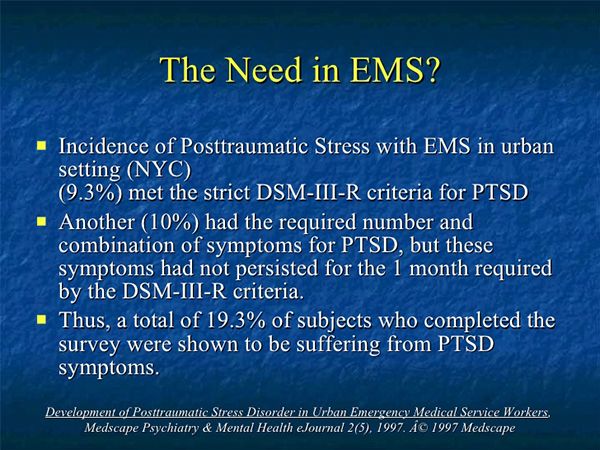By Sean Eddy
For most people, the excitement and shock of a career in EMS wears off rather quickly.
Driving with lights and sirens quickly transitions from being a rush to a nuisance, trauma becomes a mess to clean at the end of a call, cardiac arrests become a long PCR, and multi-patient incidents become a circus. We quickly figure out how to dehumanize our patients and look at them as tasks, all in the name of remaining emotionally disconnected.
Don’t get me wrong here, it’s not that we don’t care. It’s just a survival skill. It’s a means to be able to clock out, drive home, hug our families and continue living a normal life without carrying the emotional weight of our jobs with us. If you ask most of us, this is something that we are good at. We pride ourselves on being able to crack a joke in the middle of doing CPR, grab lunch after cleaning blood and tissue from our ambulance and carry on throughout the day without so much as a thought about the fatality wreck we just cleared. In many cases, we actually take it to a level where we actually view any emotional response as weakness. Until we get that wakeup call...
I’ve seen many things throughout my career and made decisions that would probably haunt most people. I’ve told countless family members that a loved one is too far beyond any chance of resuscitation, recorded a time of death on fellow members of public safety, and made triage decisions in which I considered someone dead who still had some signs of life in the name of salvaging as many people as possible.
I’ve been called a murderer by family members who couldn’t understand why I left their pulseless loved one alone to focus on three critically injured patients from the same wreck.
I’ve even attempted to terminate resuscitation efforts on what appeared to be a clear-cut case of being “down too long,” only to have my order denied by the ER physician — followed by an almost immediate return of pulses and eventually a complete recovery by the patient. For the most part, I’ve been able to carry on without too much trouble. I don’t typically lose sleep at night or get emotionally wrapped up in the things I deal with.
My wakeup call came after nearly 15 years in EMS.
I don’t care to share the specifics of the call, but I can say that it’s the only time that I walked out of the emergency room thinking I was OK until I nearly collapsed from suddenly feeling light-headed and nauseated. I struggled not to become overwhelmed with emotion as I attempted to do the customary post-call routine of charting, cleaning and restocking.
Had this happened 10 years ago, I would have told everyone that I was fine and spent the next two weeks trying to convince myself and everyone else that I was telling the truth. Fortunately for me, I’ve learned over the years that hiding emotion doesn’t equate to strength.
So when I was asked if I needed to talk, instead of saying, “I‘m fine,” I said, “Yeah, actually I do.”
I talked to coworkers, my family, my friends and even a counselor. I even gave away my following shift to give myself a chance to focus on some positive things and enjoy a little life balance before returning to work.
I returned to work on the shift following my day off and resumed my duties as I normally would. I used the opportunity to learn from the situation so that I can better prepare myself and others to deal with similar situations in the future. Most importantly, I acknowledged the emotion and dealt with it appropriately.
We may not like to admit it at times, but our job can bring on a lot of stress. Incidents like this don’t have to be career-ending. There are a lot of resources out there just waiting for people like us to take advantage of. It can be as in-depth as CISM (critical incident stress management), one-on-one counseling, or as simple as meeting a good friend for a beer at happy hour. Either way, it’s important that we address our emotions instead of hiding them.
Just remember that you’ll never see everything, and it’s never too late to get your wakeup call.













